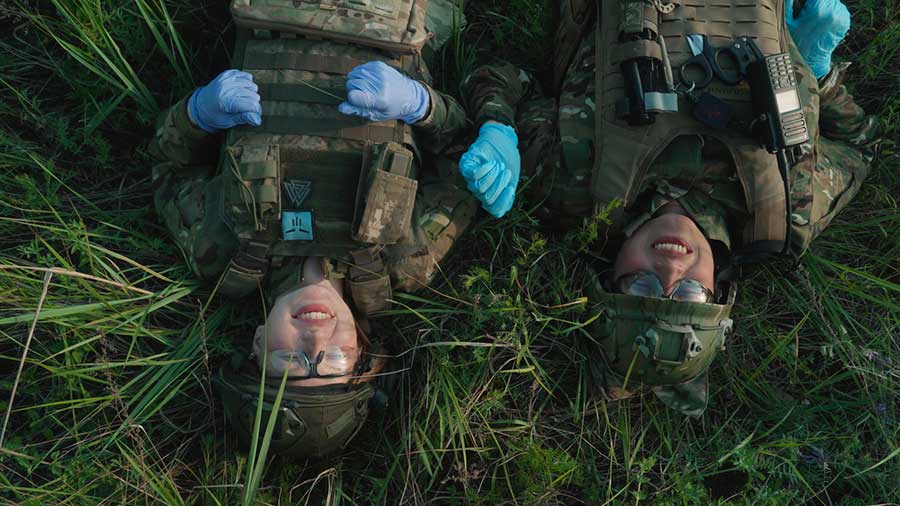Cuba & Alaska
Cuba & Alaska
VERDICT: In Yegor Troyanovsky’s warmly personal, bittersweet doc 'Cuba & Alaska'', we follow a volunteer combat medic duo of two best friends on and off Ukraine’s wartime roads.
As Russia’s full-scale invasion of Ukraine grinds on, Yegor Troyanovsky’s Cuba & Alaska, screening in the Documentary Competition at the Sarajevo Film Festival, takes us along for the ride with volunteer combat medics and best friends Yulia and Olexandra, nicknamed Cuba and Alaska, as they train soldiers on emergency first aid and tend to wounded troops.
Like a number of other documentarians depicting current conflict, Troyanovsky embraces the capability of GoPro cameras and mobile phones to offer a queasily immersive experience of the devastation being wrought on the ground and the intense emotions defenders are thrown into. Tech advances have also changed risks in the field, as we see here, with lethal drones now claiming the majority of casualties. The intimate proximity is specific to a new digital era, but the reckoning with reality it conveys is as old as humanity’s story: that war is cruelly unjust and absurd.
Cuba & Alaska is not as relentlessly nerve-shredding as another of the year’s docs, Mstyslav Chernov’s 2000 Meters to Andriivka, which embedded us with a unit, but opts instead to mix its harrowing, high-tension moments of combat with insight into who the medic duo are when they are not in the thick of the fighting. It captures effectively the cognitive dissonance Cuba and Alaska experience that is born of their urge to hold onto traces of daily normality and their pre-war passions, even as they are consumed by their commitment to the army. The film is buoyed by their playful camaraderie, as their infectious laughter and gallows humour punctuate heavier scenes of grief that are also allowed ample space to resonate. The resilience of these women shines through, as they grapple with the psychological fallout of a war they never wanted, and with the supremely fragile nature of survival, writ large at close range.
At first we accompany Cuba and Alaska as a team, as they barrel down wooded lanes in camo gear, applying torniquets in the back of speeding vehicles to staunch bleeding so that the injured do not lose their legs. These episodes of high stress have sparked a fast closeness in the unit; in their moments of rest, they hunker down close on mattresses, with a jokey banter that seems both release and optimistic shield. When Alaska is left with a fragment in her groin from a kamikaze drone that hit a nerve, she must enter into a period of rehabilitation, as she relearns to walk, separating the lives of her and Cuba into separate threads of the documentary.
Cuba’s romantic involvement with Shepa, a sharp-shooter, also comes to underscore the precious and painful nature of love in wartime. Outside her medic duties, the former music festival raver continues with her fashion design sketches, and prepares for a show in Paris of a collection pairing traditional Ukrainian embroidery with motifs of a futuristic woman warrior — a show realised in the former bedroom of Alain Delon and Romy Schneider. Vaping on the balcony of her dream event, she texts Alaska, who has been navigating the trauma of flashbacks that has accompanied her physical injuries. The continued bond of the friends is materialised in texts that pop up on-screen and video calls, a workable documentary solution to their unplanned divergence that explores anxious separation as a recurring motif of war.
While Cuba’s designs and her own courage as a military volunteer honour the figure of the warrior woman, she is too likeably down to earth and ironic for any kind of self-glorification. She claims there is no particular patriotic love of country in her enlistment; she simply wants it to be possible for her to stay in Ukraine and not give up her way of life. It’s a motivation so clear, simple, and free of ideological framing, its integrity seems all the more inviolable.
Director: Yegor Troyanovsky
Producers: Christian Popp, Hanne Phlypo, Olha Bregman
Cinematographers: Serhiy Stetsenko, Yegor Troyanovsky, Vyacheslav Tsvetkov, Eveheniya Bondarenko, François Chambe
Editor: Joelle Alexis
Sound: Ludovic Van Pachterbeke, Laurent Martin
Production companies: Tag Film (France), Clin d’oeil Films (Belgium), 2Brave Productions (Ukraine)
Sales: Java Films
Venue: Sarajevo (Documentary Competition)
In Ukrainian, French, Russian, Catalan
93 minutes


